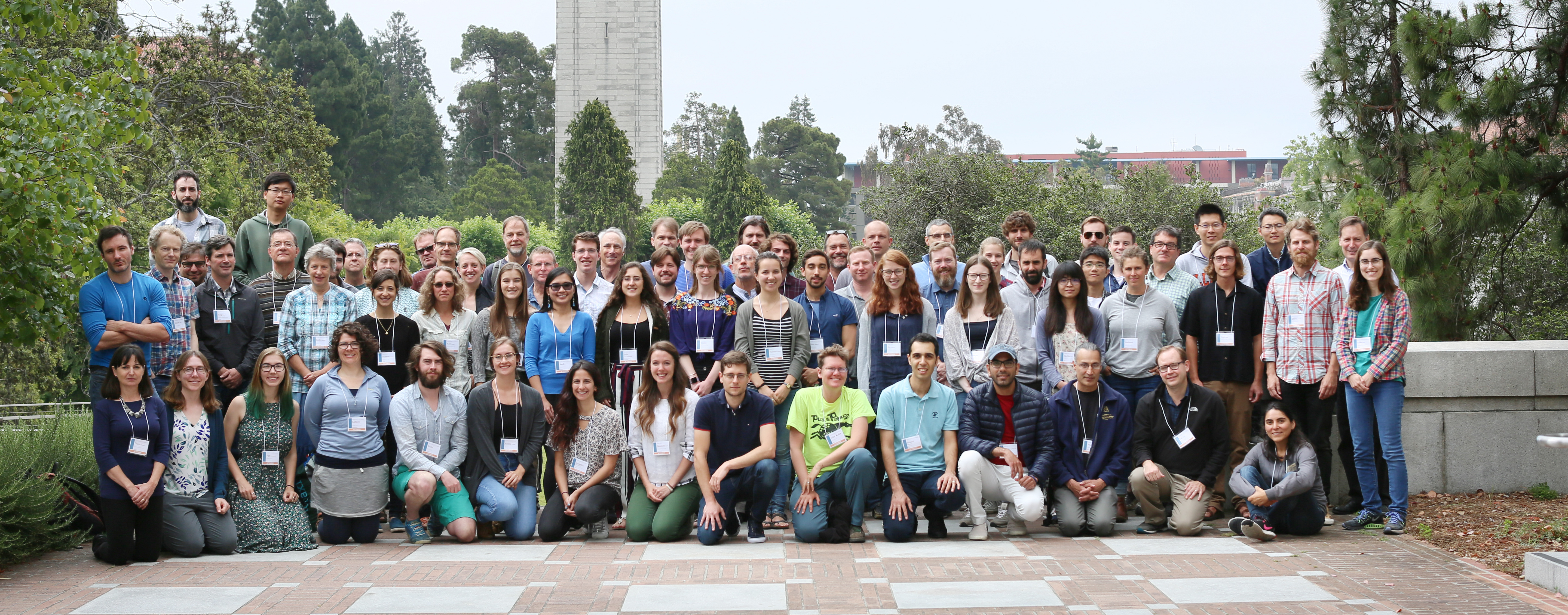"Flow in the Deep Earth"
June 26 to August 5, 2016,
KITP, Santa Barbara (CA)
Overview | Participants | Agenda and Video
Summer 2016 Overview
(Registration is now closed - as of February 1, 2016.)
Geological activity, such as mountain building and volcanism, is ultimately the consequence of the convective mass transport in the Earth’s interior. Indeed, the grand unifying theory in geophysics and Earth science—plate tectonics—fundamentally depends on the still poorly understood mechanisms that permit the Earth’s interior to flow beneath tectonic plates. Deciphering the three-dimensional structure and time dependence of this flow provides a framework for unraveling the complex, nonlinear interplay of processes that shaped the long-term evolution of Earth. The purpose of CIDER 2016 is to bring together junior and senior scientists from different disciplines to cross-educate each other and help advance this inherently multi-disciplinary question.
Read more about the science motivation.
Organizers:
- Michael Manga (U.C. Berkeley) Lead organizer
- Matt Jackson (U.C. Santa Barbara)
- Abby Kavner (UCLA)
- Thorne Lay (UC Santa Cruz)
- Barbara Romanowicz (U.C. Berkeley and IPG, Paris) ex-officio as CIDER PI
Similarly to previous CIDER summer programs, the program will be structured as follows:
Weeks 1-4 (June 27- July 23rd):Lectures, tutorials and workshop open to advanced graduate students and post-docs, as well as senior participants. ): Informal, unstructured program for participants at the assistant professor level or higher -
Weeks 5-6 (July 25th- August 5th):Informal, unstructured program for participants at the assistant professor level or higher -
A "kick-off" workshop was held at Berkeley on Sunday December 13, 2015 . The program of that workshop is available on the workshop website
Confirmed senior participants:
- Geodynamics:Jon Aurnou (UCLA); Thorsten Becker (USC); Magali Billen (UC Davis); Bruce Buffett (UC Berkeley); Louise Kellogg (U.C. Davis); Carolina Lithgow-Bertelloni (UCL); Laurent Montesi (Univ. of Maryland); Louis Moresi (U. of Melbourne); Max Rudolph (Portland State U.)
- Geochemistry: Brad Hacker (UCSB); Jasper Konter (U. of Hawaii); Roberta Rudnick (UCSB); Anat Shahar (Carnegie Inst.); Frank Spera (UCSB); Richard Walker (U. of Maryland); Bill White (Cornell)i;Qin-Zhu Yin (UC Davis).
- Mineral Physics: Quentin Williams (UC Santa Cruz); Uli Faul (MIT); Jennifer Jackson (Caltech); Jie Li (U. of Michigan); Catherine McCammon (Univ. of Bayreuth); Lowell Miyagi (U. of Utah); Chrystele Sanloup (UPMC, Paris); Dan Shim (Arizona State U.); Lars Stixrude (UCL);Rudy Wenk (UC Berkeley); Wenlu Zhu (U. of Maryland).
- Seismology: Caroline Beghein (UCLA); Sanne Cottaar (U. of Cambridge); Eric Debayle (ENS, Lyon); Steve Grand (U.Texas); Jessica Irving (Princeton Univ.); Miaki Ishii (Harvard U.); Vedran Lekic (U. of Maryland); Maureen Long (Yale U.); Meghan Miller (USC); Jean-Paul Montagner (IPG, Paris);
Researchers at the assistant professor level and higher are welcome to sign up for any part of the program, and we encourage overlap between the first and second part of the program.
The unstructured part of the program is meant to facilitate interaction betw een members of the community that have burgeoning plans to develop collaborative projects. Come to CIDER to plan your CSEDI proposals!! You will have office space, access to a desktop computer and printers, a quiet environment away from your home institution, and the possibility to interact with colleagues from various disciplines in an informal way.
Graduate students and post-docs : The lecture/tutorial program is meant for graduate students that have completed their qualifying examination, as well as post-docs. Some exceptions may be granted if well justified. The lecture program is designed to bring everyone to a fundamental understanding of progress and challenging in disciplines other than their own.
Graduate students and post-docs signing up for the tutorial part (weeks 1 -4) are required to stay at least for the 4 weeks of the tutorial program. Exceptions may be considered but priority will be given to those that commit to stay for 4 weeks. During the 2nd week of lectures (week 3 of the summer program), research questions that require a multi-disciplinary approach will be formulated, and the participants will be divided up into several groups (typically 3-5), composed of a mix of junior and senior participants, and a balance of disciplines. During the following two weeks these research groups will work on defining and addressing a well focused research project. Our experience is that one week of "workshop" is not enough to get anything done, so staying for the 4th week, i.e. 2nd week of workshop, is essential. Each group will present their work/findings on the last day of the program (see presentations from previous CIDER programs). Participants will also have free time to catch up with their regular research and other duties.Participants may bring spouses and we will do our best to accommodate families, and in particular give references for childcare. There are many programs for children on and off campus.
Support:
Travel and on-site expenses will be provided to those that stay for two weeks or longer. We cannot provide support for travel from outside of the US. However, on-site support for foreign participants (senior or junior) will be provided.
The number of participants is limited, so early applications are encouraged!
Support for CIDER 2016 participants will be provided by the NSF/FESD program through the CIDER Synthesis Center grant to U.C. Berkeley (PI B. Romanowicz).
Location:This summer program will be held at the Kavli Institute for Theoretical Physics (KITP) in Santa Barbara, CA, USA.
Applications are no longer being accepted as of February 1, 2016.
Financial Assistance Information

